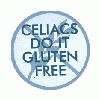-
Welcome to Celiac.com!
You have found your celiac tribe! Join us and ask questions in our forum, share your story, and connect with others.
-
Celiac.com Sponsor (A1):
Celiac.com Sponsor (A1-M):
-
Get Celiac.com Updates:Support Our Content
Abnormal Results
-
Get Celiac.com Updates:Support Celiac.com:
-
Celiac.com Sponsor (A17):
Celiac.com Sponsor (A17):
Celiac.com Sponsors (A17-M):
-
Recent Activity
-
- trents replied to Xravith's topic in Celiac Disease Pre-Diagnosis, Testing & Symptoms17
Taking Probiotics but Still Getting Sick After Gluten – Advice?
NCGS does not cause damage to the small bowel villi so, if indeed you were not skimping on gluten when you had the antibody blood testing done, it is likely you have celiac disease.- advice
- diagnostic
- (and 3 more)
-
- Scott Adams replied to Xravith's topic in Celiac Disease Pre-Diagnosis, Testing & Symptoms17
Taking Probiotics but Still Getting Sick After Gluten – Advice?
I will assume you did the gluten challenge properly and were eating a lot of gluten daily for 6-8 weeks before your test, but if not, that could be the issue. You can still have celiac disease with negative blood test results, although it's not as common: Clinical and genetic profile of patients with seronegative coeliac disease: the natural...- advice
- diagnostic
- (and 3 more)
-
- Xravith replied to Xravith's topic in Celiac Disease Pre-Diagnosis, Testing & Symptoms17
Taking Probiotics but Still Getting Sick After Gluten – Advice?
I'm very confused... My blood test came out negative, I checked all antibodies. I suppose my Total IgA levels are normal (132 mg/dl), so the test should be reliable. Still, I'm not relieved as I can't tolerate even a single biscuit. I need to talk to my doctor about whether a duodenal biopsy is necessary. But it is really possible to have intestinal...- advice
- diagnostic
- (and 3 more)
-
- Scott Adams commented on Scott Adams's article in Cookies2
Gluten-Free Cranberry Pistachio Snowball Cookies
This article may help: -
- Judy Wysocki commented on Scott Adams's article in Cookies2
Gluten-Free Cranberry Pistachio Snowball Cookies
What can I substitute for almond flour? I plan on not doing the nuts either. I'm allergic to nuts.
-





Recommended Posts
Archived
This topic is now archived and is closed to further replies.